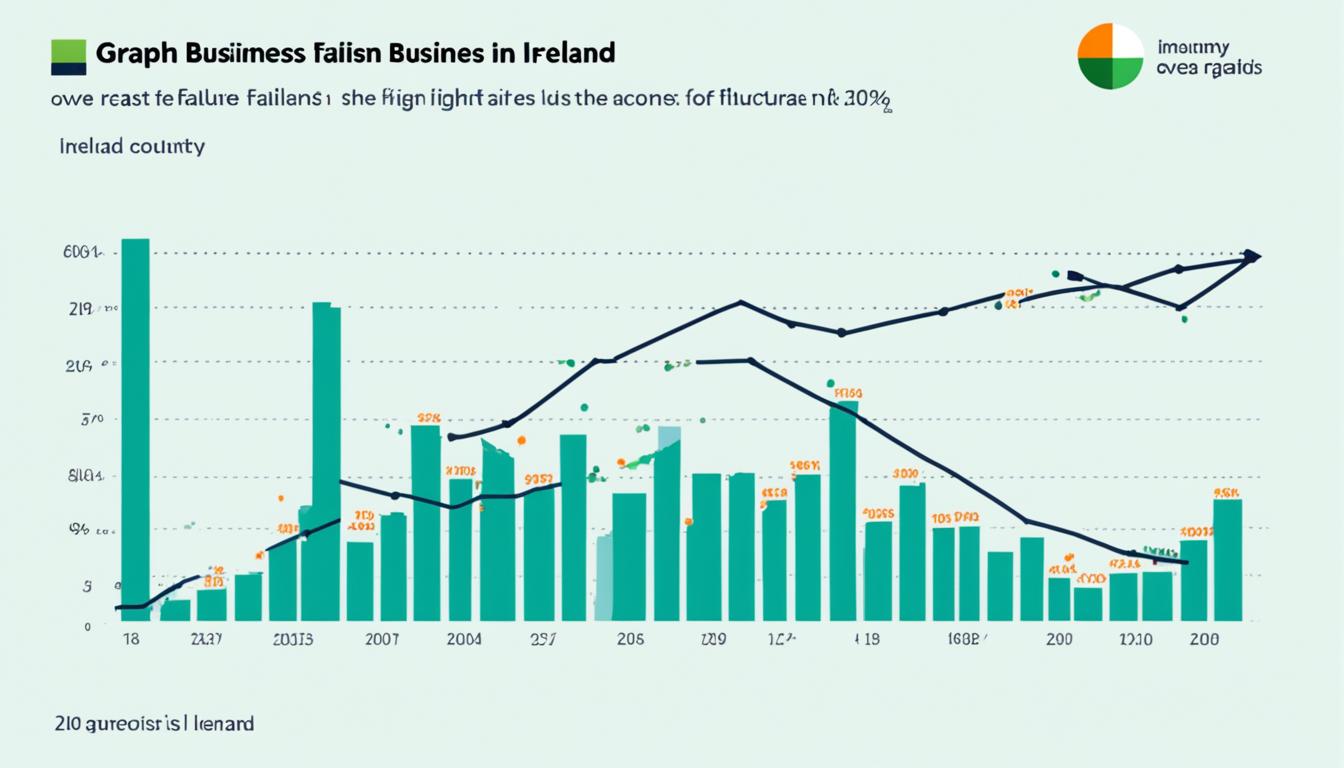The business scene in Ireland is lively and tough, full of chances and risks. It’s key for those starting or investing in businesses to grasp the failure rate in Ireland. The latest figures show what makes businesses succeed or fail here. By looking into these numbers, people can get a clearer picture of what it takes to do business in Ireland and how to avoid common pitfalls.
Key Takeaways
- High rates of business failure necessitate careful planning and management.
- Understanding economic conditions can inform better business decisions.
- Competitiveness in the market is a significant factor influencing success.
- Urban and rural areas experience varied failure rates and challenges.
- Government initiatives play a vital role in fostering business sustainability.
- The impact of COVID-19 has reshaped the business environment significantly.
Understanding Business Failure Rates in Ireland
The business failure definition is when a company stops running, often because it can’t pay its debts or meet customer needs. This is not just a problem for the owners but affects Ireland’s business climate and economy too. Knowing about these failure rates helps new and existing businesses make better choices.
Recent statistics on business failure show many reasons why companies fail in Ireland. Poor management, not enough money, and tough competition are some of the main causes. These statistics highlight patterns that can help businesses stay afloat in a tough market.
Knowing about success and failure rates gives entrepreneurs the knowledge they need to make smart choices. By looking into why businesses fail, companies can plan better, adapt, and protect themselves from market ups and downs.
| Year | Business Start-ups | Business Failures | Failure Rate (%) |
|---|---|---|---|
| 2020 | 12,000 | 1,800 | 15 |
| 2021 | 14,500 | 1,200 | 8.3 |
| 2022 | 15,000 | 1,500 | 10 |
| 2023 | 16,200 | 1,600 | 9.9 |
This table shows the growth in new businesses and failures over the last few years. It gives a clear view of statistics on business failure in Ireland. Understanding these trends is key to building resilience and innovation in the Irish economy.
What is the business failure rate in Ireland?
It’s vital to understand Ireland’s business failure rates for both new and current business owners. Recent data shows a high failure rate percentage for new businesses. About 20% of new companies fail in their first year, and nearly 60% don’t make it past five years. These business closure rates show the big challenges entrepreneurs face in different sectors.
Business failures have changed over the years. In the early 2010s, business closure rates were high due to the economic crisis. But, things have slowly gotten better since then. This change points to a recovery in the business world, but the Ireland business failure statistics still warn of the risks in starting a business.
These facts are important for everyone involved in the business world in Ireland. By looking at these trends, we can make plans to help businesses succeed more often. This will create a more stable business environment.
Recent Trends in Business Failure Rates
Looking at business failure trends in Ireland shows ups and downs over the years. Year-on-year stats highlight changes, with some sectors doing better or worse. This info helps us see which industries face more risks and how to lessen those risks.
Year-on-Year Comparison
Comparing business failure rates from year to year shows both stability and changes. For example, 2022 saw a big increase in failures due to economic issues. But, 2023 showed a drop, hinting at recovery in some areas. Here’s a table that breaks down these changes:
| Year | Business Failures | Year-on-Year Change (%) |
|---|---|---|
| 2021 | 3,200 | – |
| 2022 | 4,500 | 40.6 |
| 2023 | 3,800 | -15.6 |
Sector-Specific Insights
Looking at specific sectors, we see some face more failure risks. The hospitality sector struggled after the pandemic, but tech startups were more resilient. Knowing this helps us focus on improving certain areas. Here are some key sectors and their failure rates:
- Hospitality: High failure rates due to changing consumer behaviour.
- Retail: Struggles attributed to online competition.
- Technology: Growth and innovation leading to better performance.
Business failure trends in Ireland tell us a lot about the economy and what consumers want. By keeping an eye on these trends, businesses can make smarter choices. This helps them stay in business longer and avoid failure.
Factors Contributing to Business Failures

The Irish business scene is shaped by many factors that lead to business failures. These include economic conditions, management issues, and the competitive environment. Each of these plays a big part in why businesses don’t make it.
Economic Conditions
The economy greatly affects business success. Economic ups and downs, like recessions or inflation, hit small to medium businesses hard. When the economy is down, people spend less, which hurts business sales. Also, rising costs from inflation can make it tough for businesses to keep up financially.
Management Challenges
Leadership is key to a business’s success. Poor management is a top reason for failure. Issues like bad communication, not using resources well, and not adapting to market changes can trip up even strong companies. Training managers and having a solid plan can help avoid these problems.
Market Competition
The competition in Ireland’s market is tough. New companies and aggressive pricing make it hard for others to stay ahead. If a business can’t stand out, it risks being left behind. Knowing what customers want and how the market changes is vital to stay competitive.
| Factor | Impact | Solutions |
|---|---|---|
| Economic Conditions | Reduced consumer spending; increased operational costs | Financial forecasting; cost management strategies |
| Management Challenges | Poor decision-making; lack of strategic direction | Leadership training; resource allocation audits |
| Market Competition | Loss of market share; price wars | Market research; innovation in offerings |
The Impact of COVID-19 on Business Viability
The COVID-19 pandemic has changed the business scene in Ireland a lot. Many companies had to close for good. Sectors like hospitality, retail, and tourism were hit hard by lockdowns and social distancing.
These industries needed people to come in often but saw a big drop in customers. This led to hard choices about staff and how to keep going.
Despite the big economic hit, Ireland is starting to recover. Businesses are finding new ways to stay afloat. Many are using digital tools to connect with customers and work better.
This move online is key for those wanting to survive and adapt after the pandemic.
Getting businesses back on track in Ireland will need focused support and smart planning. Companies that innovate and adapt are more likely to bounce back. Looking at how businesses have changed will help as Ireland stabilises.
| Sector | Impact Level | Recovery Strategies |
|---|---|---|
| Hospitality | Severe | Shift to takeaway and outdoor dining |
| Retail | High | Increased online sales and digital marketing |
| Tourism | Critical | Promotional campaigns and local tourism initiatives |
| Manufacturing | Moderate | Investment in technology and automation |
Regional Variations in Business Success
Understanding the differences in business success across Ireland is key. The urban and rural divide is a major factor. It affects how businesses do in different places.
Access to resources and market size varies between cities and countryside. This affects how well businesses can do.
Urban vs. Rural Areas
Business success changes a lot between urban and rural areas. Cities have more people, giving businesses a bigger market. They also have better infrastructure and resources.
Rural areas often have fewer customers and less chance to network. This urban-rural gap brings both challenges and chances for businesses.
Industry Concentration Effects
Industry clusters also play a big part in business success. Places with lots of tech or manufacturing businesses gain from sharing resources and ideas. This leads to more innovation, more investment, and better survival in tough times.
Businesses in these clusters usually do better than those alone in the countryside.
| Region Type | Average Business Success Rate (%) | Key Industries |
|---|---|---|
| Urban | 75 | Technology, Retail, Services |
| Rural | 50 | Agriculture, Tourism, Craftsmanship |
| Industry Clusters | 80 | Technology, Biotechnology, Manufacturing |
Preventative Measures for Reducing Business Failure
Business owners face many challenges that could lead to failure. It’s key to take steps to stay stable and grow. By managing finances well, planning carefully, and using government support, businesses can be strong during hard times.
Financial Management Strategies
Good financial management is crucial to avoid business failure. Companies should use budgeting, check their finances regularly, and control costs. These steps help understand cash flow and profits. This lets businesses make quick changes to stay safe.
Importance of Business Planning
Planning your business well is also vital. A good plan sets goals, shows where you stand in the market, and outlines how to succeed. This improves decision-making and helps spot potential problems early.
Utilising Government Resources
There are many government support programs for businesses. These include funding, grants, and advice. Using these resources gives business owners the tools and advice they need to deal with market challenges.
| Strategy | Description | Benefits |
|---|---|---|
| Financial Management | Regular budgeting and monitoring of cash flow | Improved financial health and risk mitigation |
| Business Planning | Creating a comprehensive business plan | Enhanced clarity and strategy implementation |
| Government Resources | Accessing grants and advisory services | Support in overcoming financial and operational hurdles |
Success Stories: Overcoming Business Challenges

Entrepreneurship in Ireland is full of stories of resilience and success. Many businesses have overcome tough times, showing that with determination and new ideas, anything is possible.
*The Woollen Mills* is a great example. They faced big challenges during a tough economic time. They changed their business by focusing on online sales, which helped them reach more customers. This move saved jobs and made their brand popular online. Their story is a key part of Ireland’s business success stories.
*Ballymaloe Foods* is another inspiring story. They started small but struggled to get noticed. They changed that by connecting with local communities at food festivals and markets. This built a strong customer base that loved their fresh, organic food. Their story shows how focusing on the community can help overcome business hurdles.
Businesses that are open to change and find new ways to solve problems often succeed. *The Happy Pear* is a great example. They focused on sustainable practices like local sourcing and eco-friendly packaging. This approach helped them stand out in a crowded market and be known for their health and environmental commitment. Their story highlights the importance of being adaptable in business.
These success stories share a common theme: businesses that actively tackle challenges with new ideas and community ties tend to do well. Here’s a quick look at the key strategies from these stories:
| Business | Challenge Faced | Strategy Adopted | Outcome |
|---|---|---|---|
| The Woollen Mills | Economic downturn affecting sales | Shifted focus to online sales | Increased market reach and job preservation |
| Ballymaloe Foods | Low market visibility | Engaged with local communities | Established a loyal customer base |
| The Happy Pear | Market competition | Emphasised sustainability and local sourcing | Enhanced brand reputation and sales |
Role of Innovation and Technology in Business Longevity
Innovation and technology are key for businesses to last in today’s fast-changing world. They help companies stay ahead by adapting quickly. By using new tech, businesses can make their work smoother, improve how they serve customers, and stay ahead in a crowded market.
Adapting to Digital Transformation
Changing to digital ways is crucial for businesses to grow. It lets them use new tech fully. Important steps include:
- Using cloud solutions for better work flow.
- Getting insights from data to make smart choices.
- Boosting customer connections with CRM systems.
Companies that adapt well often grow a lot. This shows how big a role technology plays in their success. Irish tech leaders like Intercom and Stripe show how new ideas can give big market edges.
Importance of Research and Development
Putting money into research and development (R&D) is key for new ideas. It helps companies keep up with trends and know what customers want. Those that focus on R&D tend to:
- Create new products that customers want.
- Keep improving their products.
- Build strong rights to their ideas.
Staying innovative makes companies more competitive and helps the economy grow. By encouraging creativity, companies unlock their team’s potential. This leads to more progress and lasting success.
| Type of Investment | Expected Outcome | Example of an Irish Company |
|---|---|---|
| Digital Tools Adoption | Increased Efficiency | Intercom |
| R&D in New Products | Market Expansion | Stripe |
| Data Analytics Investment | Informed Decision-Making | HubSpot |
The Role of Business Networks in Reducing Failure
Business networking is key to success in a tough market. It helps create strong relationships that are crucial for support. These networks offer resources, knowledge, and encouragement to help business owners overcome hurdles.
Mentorship is a big part of these networks. It gives new entrepreneurs advice from experts. This advice can help avoid mistakes and lower the chance of failure. Being part of a network lets people share experiences and strategies, making everyone more effective.
One big plus of collaboration benefits is sharing resources. This is especially good for small businesses. By working together, they can split the cost of marketing, tech, and training. This makes them more efficient without spending too much money.
The following table shows how business networks help keep businesses stable:
| Element | Description | Impact on Business Stability |
|---|---|---|
| Networking Events | Opportunities to meet potential partners and clients. | Increases visibility and access to new markets. |
| Mentorship Programs | Guidance from experienced business leaders. | Reduces likelihood of errors in decision-making. |
| Resource Sharing | Collaboration in marketing, technology, and training. | Enhances efficiency and reduces costs. |
| Emotional Support | A sense of community during challenging times. | Improves resilience and reduces stress levels. |
Using business networking well lets businesses use the strength of many. It creates a place where shared knowledge leads to growth. Being in a supportive group can really help avoid the risks of failure. This shows how important these networks are in today’s changing market.
Understanding the Legal Landscape for Businesses in Ireland
In Ireland, businesses must follow certain laws to operate smoothly. It’s vital to know these laws to stay on the right side of the law. This knowledge helps businesses avoid legal issues and risks.
Regulations and Compliance
Getting through the legal maze means knowing the rules that affect your business. Key areas to focus on include:
- Company Registration: Following the Companies Registration Office’s rules.
- Tax Compliance: Making sure to submit VAT, corporation tax, and payroll taxes on time to Revenue.
- Health and Safety: Following laws to keep employees and customers safe.
- Data Protection: Staying within the General Data Protection Regulation (GDPR) to handle personal data safely.
- Employment Laws: Knowing the rights and duties under employment laws.
It’s important to keep up with any changes in these laws. Not following them can lead to legal trouble and harm your reputation. Keeping an eye on these changes helps businesses stay ahead.
| Regulation | Description | Compliance Measures |
|---|---|---|
| Company Registration | Legally registering the business with the Companies Registration Office | Complete application and pay required fees |
| Tax Compliance | Submissions of various taxes to Revenue | Maintain accurate financial records; submit returns on time |
| Health and Safety | Legislation to ensure safe working environments | Conduct regular risk assessments; implement training programs |
| Data Protection | Regulations governing personal data handling | Conduct data audits; ensure privacy policies are in place |
| Employment Laws | Rights and obligations of employees and employers | Review employment contracts; monitor working condition standards |
The Importance of Industry Analysts and Reports

Industry analysts and their reports are key in shaping business strategies across different sectors. They provide deep insights that help companies understand complex markets. These reports show what’s happening now and predict what might happen next, helping businesses get ready for the future.
Using industry reports helps spot potential risks. Companies can see where they might face problems and take steps to avoid them. These reports also give insights into how to change strategies when customers’ needs or competitors change.
Analysts’ insights can give a company an edge over its competitors. By keeping up with market trends, businesses can innovate and make products or services that customers want. This is crucial in today’s fast-changing markets.
Putting industry reports to use helps make better, informed decisions. As companies deal with new challenges, using market insights is key for growth and success.
Investment Trends and Their Impact on Business Stability
Investment trends in Ireland have changed a lot lately. They affect many businesses across different sectors. Domestic and foreign investments are key in shaping the funding scene. Ireland is now a top spot for startups and big companies thanks to more venture capitalists and angel investors.
Foreign direct investment (FDI) is a big boost for the economy. Big companies see the benefits of being in Ireland, like a skilled workforce and good tax rules. This brings more money into the country, helping local businesses grow and innovate. This makes the economy more stable.
New trends in investing in green industries show investors care more about the planet. Companies that focus on being green can get more funding. This change shows that people want to buy products and services that are good for the earth.
Businesses can use these trends to their advantage. They should build strong networks and make pitches that speak to what investors want. Knowing how the funding scene is changing helps entrepreneurs plan better. This can lead to more stability and a competitive edge for their businesses.
Government Initiatives to Support Business Sustainability
The Irish government is key in creating a supportive environment for sustainable businesses. It offers help to entrepreneurs through funding and skills development. These programmes aim to help businesses not just survive but flourish in a tough market.
Funding and Grants
There are many funding options for businesses wanting to grow or innovate. Grants cater to different sectors and development stages. They ease financial stress, allowing businesses to invest in key areas. Here’s a closer look at these funding chances:
| Type of Funding | Description | Eligibility Criteria |
|---|---|---|
| Innovation Grants | Support for research and development projects aimed at innovation. | Open to SMEs engaging in innovative projects. |
| Start-Up Funding | Assistance for newly established businesses to help them grow. | Applicable to businesses under two years old. |
| Export Assistance | Funding to help businesses expand into international markets. | Eligibility is determined by business export potential. |
Training and Development Programs
Skills development in Ireland is vital for business competitiveness. The government offers training to improve the skills of business owners and their teams. These cover finance, marketing, and leadership. Joining these programmes gives entrepreneurs the skills to overcome challenges. Key offerings include:
- Workshops on digital marketing strategies
- Leadership development courses for management teams
- Networking events connecting businesses to industry experts
The Psychology of Business Owners Facing Failure
Business owner psychology is key to how entrepreneurs deal with setbacks. The emotional impact of failure can really affect mental health. Owners face huge pressures that can lead to anxiety, depression, and stress. It’s vital to understand these psychological aspects to support business leaders through tough times.
Emotional and Mental Health Considerations
Starting a business comes with many challenges that can hurt mental health. Knowing the mental health issues owners face helps tackle emotional problems early. Many feel isolated when they fail, which can make negative feelings worse and slow down recovery. It’s crucial to recognize these feelings and get support to improve mental health.
Resilience and Adaptability
Being resilient in business means not just recovering from failure but also adapting to challenges. Owners who are resilient see change and uncertainty as opportunities. This adaptability is key for success, letting them change strategies while keeping their goals in sight. Taking care of personal well-being through mindfulness and stress management boosts resilience, helping them get through hard times.
| Aspect | Impact on Business Owners |
|---|---|
| Isolation | Increased feelings of depression and anxiety |
| Pressure | Heightened stress levels affecting decision-making |
| Support Systems | Improved emotional stability and coping strategies |
| Resilience Training | Enhanced ability to adapt and recover |
By focusing on these psychological factors, business owners can boost their chances of success. Knowing their strengths and weaknesses is key for keeping the business and their mental health strong.
Future Outlook for Businesses in Ireland
The future for businesses in Ireland looks bright as the economy grows and changes. With a push for new ideas and green practices, companies will use new tech and changing trends. After the pandemic, sectors like tech, renewable energy, and online shopping are set to grow a lot, bringing big growth.
Businesses must stay quick and adaptable in a changing global economy. Things like new trade rules and climate change will affect the market a lot. Those that stay flexible and invest in skills and tech will do well.
Looking ahead to the next ten years, businesses should aim for growth and sustainability. By keeping an eye on the economy and always improving, they can find new chances and stay strong against future problems. This forward-thinking is key to staying ahead and bringing new ideas to the market.
FAQ
What is the current business failure rate in Ireland?
About 40% of new businesses in Ireland don’t make it past five years. This shows the tough challenges new businesses face. It’s key to know why so many fail.
What factors contribute to business failures in Ireland?
Many things lead to businesses failing, like tough economic times and poor management. The competition is also fierce. Knowing these reasons is vital for new entrepreneurs.
How did COVID-19 affect businesses in Ireland?
COVID-19 hit businesses hard in Ireland, causing many to close, especially in hospitality and retail. Now, they need strong recovery plans to bounce back.
Are there noticeable differences in business success rates between urban and rural areas?
Yes, cities usually have more successful businesses because they have more resources and customers. Rural areas face issues like fewer people and limited services, making it harder for businesses to grow.
What preventative measures can businesses take to reduce failure rates?
Businesses can manage their money better, plan well, and use government help like grants and advice. These steps can help them stay competitive.
What role does innovation play in business longevity?
Being innovative and using technology helps businesses last longer. Companies that keep up with digital changes and invest in research do better in the market.
How can networking benefit business owners?
Networking helps with working together, getting advice, and sharing resources. It lowers the chance of failure. Making the right partnerships also makes businesses stronger during tough times.
What government initiatives exist to support business sustainability in Ireland?
The Irish government gives out funds and grants to help businesses stay strong. There are also training programs to improve entrepreneurs’ skills and knowledge.
How important are industry analysts and reports for businesses?
Industry experts and market data are very important for businesses. They help spot risks and chances, letting companies stay ahead.
What is the future outlook for businesses in Ireland?
The outlook for businesses in Ireland looks hopeful, with growth expected and new chances. But, they need to stay quick to deal with challenges and grab new trends.







